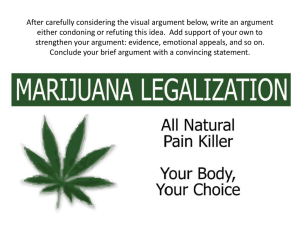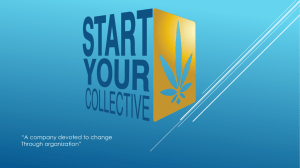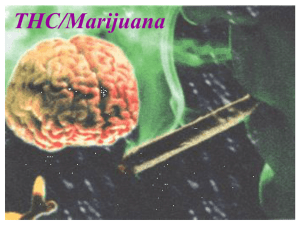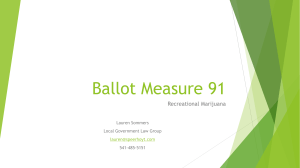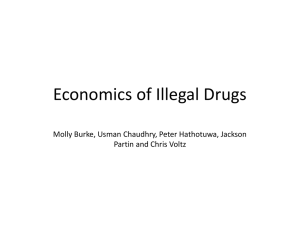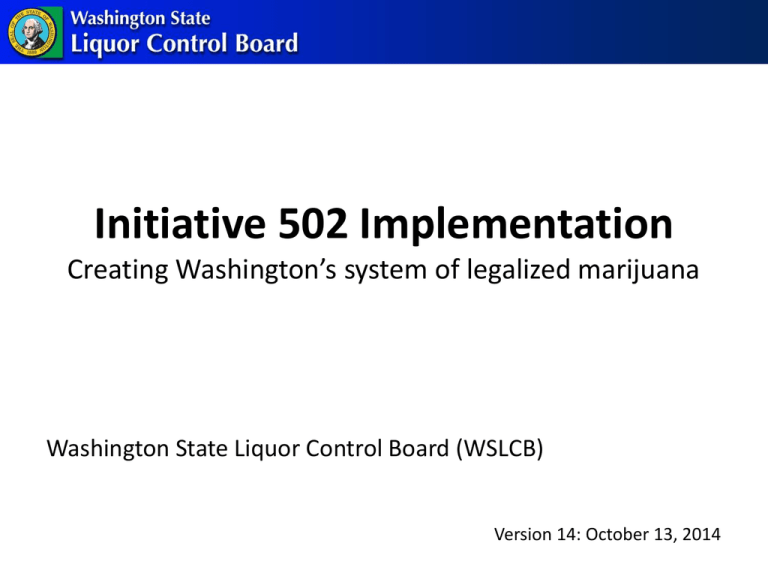
Initiative 502 Implementation
Creating Washington’s system of legalized marijuana
Washington State Liquor Control Board (WSLCB)
Version 14: October 13, 2014
Overview
Today’s Presentation
•
•
•
•
•
•
•
•
•
Disclaimer
I-502 key elements
Agency objective for implementing I-502
Rules highlights
Licenses
Sales activity
Education and outreach
Issues and challenges
Staying connected
2
Disclaimer
Today’s presentation is designed to inform this
audience of the current status of Initiative 502’s
implementation, its timeline, challenges facing the
state and expected next steps.
The views expressed today represent the speaker’s
summary of these current events and are subject to
change based on the final decisions of the Board.
3
I-502 Key Elements
Creates world’s first comprehensive system of growing, processing
and retailing marijuana.
• Legalized system of producing, processing and retailing marijuana for adults
age 21 and older
•
Decriminalizes possession of one ounce of marijuana
– 1 ounce of useable marijuana for smoking
– 16 ounces in solid form
– 72 ounces in liquid form
• Creates three-tier system of licensing, regulation and taxation similar to
alcohol
– Producer license (grower)
– Processor license (prepares for retail)
– Retail license (operates marijuana only stores)
4
Key Elements continued
Washington’s system…
• Taxation
– Imposes 25% tax at all three license levels
– B&O and local sales tax also apply
– OFM fiscal note estimated between $0 and $2 billion over five years
• Public Safety and Education
– Establishes a THC bloodstream threshold for marijuana DUI’s
– Limits on store locations, advertising and number of outlets
– Earmarks revenue for healthcare, research and education
5
Agency Objective
Public Safety
•
Create a tightly controlled and regulated marijuana market
Agency Role and Responsibilities:
•
•
•
•
Created a 3-tier regulatory system for marijuana
Created licenses for producer, processor and retailer
Enforcing laws and rules pertaining to licensees
Collecting and distributing taxes/fees
6
Rules Highlights: License Requirements
Licensed Location: 1,000 Foot Measurement
•
Under the Board’s rules, the 1,000’ buffer between the property line of the
licensed business and the property line of places where children congregate is
measured using the shortest straight line.
Costs and Fees
•
•
•
$250 application fee
$1,000 annual renewal fee
Additional fees for background check and filing for local business license
Taxes
•
License applicants must submit a signed attestation that they are current on
taxes owed to the Washington State Department of Revenue
Insurance
•
Licensees are required to carry commercial liability insurance
7
Rules Highlights: Public Safety
Producer Structures
• Rules allow producer operations in secure indoor and outdoor grows, as
well as greenhouses
Traceability
• LCB employs a robust and comprehensive traceability system (software)
that traces product from seed/clone to sale
• LCB enforcement can match records to actual product on hand
Local Authority Objections
• Substantial weight is given to a local authority during the renewal process
based upon chronic illegal activity associated with the licensee’s operation
of the premises
8
Rules Highlights: Public Safety
Background Checks
• Personal criminal history form
• Fingerprinting of all potential licensees
• WSP and FBI back background checks of licensees and financiers
Security and Safeguards
• Alarm and surveillance video camera requirements (including minimum
pixels and lockbox encasement)
• Strict transportation and record keeping requirements (no third party
transport of product)
• Hours of operation limited to 8:00 a.m. to 12:00 a.m.
9
Rules Highlights: Public Safety
Violation Guidelines
• $1,000 administrative penalty for minors frequenting
• Sets strict tiered system of violation record over a three year period.
Example:
– Group 1 public safety:
• First violation: 10 day suspension or $2,500
• Second violation: 30 day suspension
• Third violation: license cancellation
• Furnishing marijuana to a minor remains a felony offense
Child Resistant Packaging
•
Specific requirements for marijuana and marijuana infused products in solid
and liquid forms
10
Rules Highlights: Public Safety
Advertising Restrictions
•
•
•
Law restricts advertising within 1,000 feet of schools, public parks, transit
centers, arcades, and other areas where children are present
May not contain statements or illustrations that: are false or misleading,
promotes overconsumption, represents that its use has curative or therapeutic
effects, depicts a child or may be appealing to children
All advertising must contain two statements: a: “This product has intoxicating
effects and may be habit forming.” And, b: “Marijuana can impair
concentration, coordination, and judgment. Do not operate a vehicle or
machinery under the influence of this drug.”
Limits on Retail Stores
•
•
Allocated 334 retail licenses statewide to cities and counties to ensure
dispersion.
In areas where applications outnumbered available licenses, lotteries were
held to award licenses
11
Rules Highlights: Consumer Safety
Strict Packaging and Labeling Requirements
•
•
•
•
•
•
Limited servings and concentration per package
Lot number
Warning label
Net weight
Concentration of THC
Usage warnings (specific warning for ingestible foods
and/or liquids about effect delays)
• Upon request
– Third party lab that tested lot and results
– All pesticides, herbicides, fungicides found in product
12
Rules Highlights: Consumer Safety
Lab Tested and Approved
• All lots will be tested by independent accredited labs
• Established and uniform testing standards
Store Signage and Product Warnings
• No minors allowed in stores
• Required product and usage signs within stores
Store Signage and Product Warnings
• No minors allowed in stores
• Required product and usage signs within stores
13
Rules Highlights: Consumer Safety
Behind the Counter Storage
•
•
No open containers or handling of product
Sniff jars with sealed, screened-top lids allowed
Defined Serving Size
•
Defined serving sizes on marijuana-infused product label
– 10 mg of THC per serving
– 100 mg of THC per product
– Serving size must be physically indicated using scoring
– A single unit of marijuana-infused extract for inhalation cannot exceed one
gram
Transaction Limits on Concentrates
•
A single transaction is limited to seven grams of marijuana-infused extract for
inhalation
14
Licenses
Issued as of Oct 15, 2014:
Producer/Processor – 279 licenses
• 201 Producer/Processor
• 60 Producer only
• 18 Processor only
• 22 licenses pending payment
Retail – 68 licenses
• 53 retail outlets have reported sales
• 24 of 39 counties have at least 1 licensed store
• 18 counties have multiple stores
15
Sales/Tax Activity
Sales Activity
• Total Sales (July 8 – Oct. 13): $23,974,012
–
–
–
–
July:
August:
September:
October:
$3,368,368
$7,261,712
$8,601,234
$4,742,698
Excise Tax Due:
• Total Tax (July 8 – Oct 13): $ 5,993,503
– Due on the 20th of the month following sales activity
– 100% collection of taxes owed for July and August
16
Education and Outreach
Materials
•
Social Media PSA’s
– Fact-based PSAs focus on educating the public on three key components: age 21, not driving and
smoking and consuming in public.
– Collaboration between LCB, WTSC and Dr. Leslie Walker, Chief of Adolescent Medicine at Children’s
Hospital
•
Consumer’s Guide
– Focuses on today’s marijuana potency as well as the basics of the law.
– Available in retail stores once they begin opening.
•
Parent Information Guide
– Contains information parents need to know about the law and how to talk to their kids about it.
– Distributed to community leaders at the local level.
– Partnered with DSHS to produce 50,000 copies.
•
Informational Websites
– www.LearnaboutmarijuanaWa.org
– www.starttalkingnow.org
17
Upcoming Challenges
Bans and Moratoria
• Judge ruled that because I-502 was silent on bans/moratoria that
cites/counties can ban marijuana businesses
• Judge didn’t rule on the issue of federal preemption
• Ruling likely to be appealed to WA Supreme Court
Marijuana Infused Products/Public Safety
• Board took steps back in June by adding additional safeguards to its already
comprehensive rules
– Products must be approved by the Board
– Products must carry an identifier that they contain marijuana
– Require homogenization to ensure uniform distribution of THC and that products are scored
to physically indicate servings
• Approved products – 51
Denied products – 8
18
Upcoming Challenges cont.
Additional Marijuana Infused Products Rules
• The Board revised the rules to further tighten and clarify:
– Products containing more than one serving must be packaged in a
package that remains child resistant after the package is opened (resealable);
– Products that contain multiple individual servings, each serving must be
individually wrapped;
– Marijuana-infused products such as, but not limited to, gummy candies,
lollipops, cotton candy, or brightly colored products, are prohibited.
Supply/Price
• To date we have licensed over three million square feet of growing space
for plant canopy
• More producers/processors licensed each week adding to the supply
chain which should cause prices to drop but no guarantees
• Ultimately the market will dictate price, the Board does not set prices
19
Potential Issues
Federal Guidelines
•
•
Doesn’t change federal law
Focuses on eight points of emphasis including youth access and public safety
Minimizing Illicit Market
•
Balancing product demand with production and over-production
Medical Marijuana
•
•
•
Uneven playing field, competing system that is largely untaxed and unregulated
Confusion over what is/isn’t allowed and which locations are/aren’t licensed
Legislature made no changes to medical marijuana during last legislative session
Banking
•
•
Dept. of the Treasury allows banks to do business with marijuana licensees
Continuing to work with the WA’s congressional delegation and the Department
of Financial Institutions to open up the banking system to additional licensees
20
Staying Connected
• Visit the I-502 Webpage. www.liq.wa.gov
• Factsheets
• FAQs
• Timelines
• YouTube video and/or audio of public forums
• Listserv with over 10,800 subscribers to date
• Webinars with city and county officials
• Public hearings on rules are posted on website and publicized on
the listserv
• News coverage is hard to miss. AP top story of 2012, 2013
21
Thank you
22


